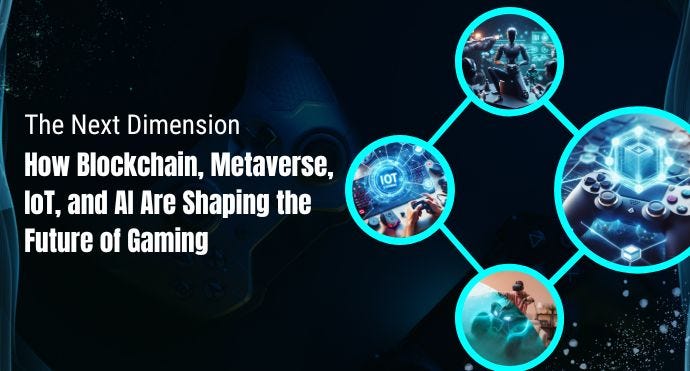The Next Dimension: How Blockchain, Metaverse, IoT, and AI Are Shaping the Future of Gaming

Have you ever played games like Pokemon Go and Zombie Go?
Aren’t they super thrilling and exciting?
How about games that make you feel like you are playing in a stadium filled with people?
Well, as breathtaking as they are, these games are the result of the latest Augmented and Virtual Reality.
The future of gaming is definitely something to look forward to, with consumer demand constantly growing and technology advancing like never before. With this, many new incentivization and monetization models came into being.
According to the latest analysis, the global revenue for games is capable of growing more than 50% over the next 5 years. This predicts that the gaming industry is going to completely consume time from other platforms and become the core platform for both nonmedia and media
experiences, thus turning into the most significant part of our life.
However, huge virtual games (Y. Lee, C. Moon, H. Ko, S.-H. Lee, B. Yoo) that are played by a limited crowd of gamers will be the main contributors to the industry’s profits through their interactive and engaging monetization models like microtransactions within the game and through other media like e-commerce and virtual events.
To empower the gaming industry to be more fair and secure, developers have massively been using the latest technologies like Blockchain, AI, IoT, and Metaverse.
Let’s take a look at how these technologies will benefit the gaming industry,
Blockchain
Blockchain is a decentralized distributed ledger majorly used for performing secured transactions and maintaining records (Nakamoto, 2008). It creates a new spectrum in the field of gaming with participants who utilize non-fungible tokens and cryptocurrencies to make in-game transactions, etc. This can further be for real-life money.
Did you know Blockchain gaming activities skyrocketed by 2000% in 2022 in comparison to 2021?
Contesting from the Mirco and Marco economics point of view, the integration of Blockchain technology in gaming has been termed as a ‘’stable asset’ that has swam beyond a $2.5B investment by many global investors and Venture capitalists.
Likewise, development activities have been simultaneously accelerating in the gaming dApps segment. At the same time, Metaverse has been pouring opportunities for games to radiate in the Blockchain cosmos.
Benefits
Safe & Secure Environment For Game Developers and Entrepreneurs
Cost-effective Payment Processing
Minimize Fraudulent Activities
Players Get to Own The In-game Assets Truly
Safety and Security of Gaming Items Storage
Cut Down The Price of Gaming Assets
Examples: Cryptokitties, Upland, Gods Unchained, Decentraland, The Last Will,
Metaverse
The idea of Metaverse has been around for a while. Thanks to great advancements in technology, the virtual world has become a reality today. When it comes to Metaverse Gaming encompasses virtual gaming where you can enjoy games with your own virtual avatar.
Gaming in the metaverse realm offers many exciting features and apps that are rewarding and fun to play.
Numerous Financial Institutions have predicted the potential of the ever-evolving decentralized Metaverse with an $8 trillion market. The integration of Blockchain Technology in gaming applications will significantly fuel the growth of this market.
Stats
- 97% believe Metaverse is the center of the Gaming industry.
- 48% stated Metaverse creates multiple new business model opportunities.
- 49% are prioritizing investing in VR, AR, and MR experiences.
Benefits
- More equal access to virtual experiences
- Improbable and even impossible experiences
- More accurate representations of physical objects in the virtual world
- New business opportunities
- Heightened social connections and lifelike interactions
- Better collaboration and co-creation
- More effective, efficient testing and training
Examples: The Sandbox, Epic Game, Decentraland, Meta Platforms, Improbable
IoT
The Internet of Things (Kevin Ashton) is a special technology that involves gathering data in real-time. In simple words, everything we’re surrounded with can be provisioned with sensors (Taylor & Francis) that can give us real-time data such as temperature fluctuations, violations, new objects in the surroundings, and lighting.
New IoT algorithms (AK Sangaiah, AAR Hosseinabadi, MB Shareh) are introduced on a daily basis in the market, such as the ability to utilize a mobile phone instead of purchasing costly consoles, which many people already own today.
In the past few years, many adaptive sensors have been launched in the market that can be connected via mobile device, Bluetooth. This allowed many possibilities of IoT.
IoT has improved the growth and market of mobile games; according to the modern era, smartphones can now operate the most advanced online games.
Benefits
- Personalized Gaming Experience
- Increased User Engagement
- Improved Game Development
- Better Interconnectivity:
- Real-time Analytics
- More Immersive Experiences
AI
Artificial intelligence is a kind of programming that permits characters in a game (non-playable characters (NPC), and enemies) to perform in a way as if they were controlled by a human, or were acting with a mind of their own.
AI can be used to make the gaming industry more immersive and interactive.
Now- a- days AI is being used in some way or the other. AI has been largely focusing on pathfinding, finite state machines which are basically AI-controlled NPC and behavior based on certain conditions. This makes gameplay more immersive with more features.
Benefits
- Enhanced Player Experience
- Intelligent Game Balancing and Testing
- Web 3 Innovations
- Testing and Bug Detection
- Providing players with endless variations
Examples:
F.E.A.R., The Last of Us, Tom Clancy’s Splinter Cell: Blacklist, XCOM: Enemy Unknown, Halo: Combat Evolved, Minecraft, Rocket League, Stockfish, Google Quick Draw, FIFA, Red Dead Redemption 2, Half-Life, Grand Theft Auto 5, Middle Earth: Shadow Of Mordor, Dark forest, AlphaGo Zero
Conclusion
All these technologies are the true game changers of the gaming industry as they uplift gaming to a whole new level. The combination of these technologies has great potential to create and develop many outstanding games that will change the future for the greater good.

Comments
Post a Comment